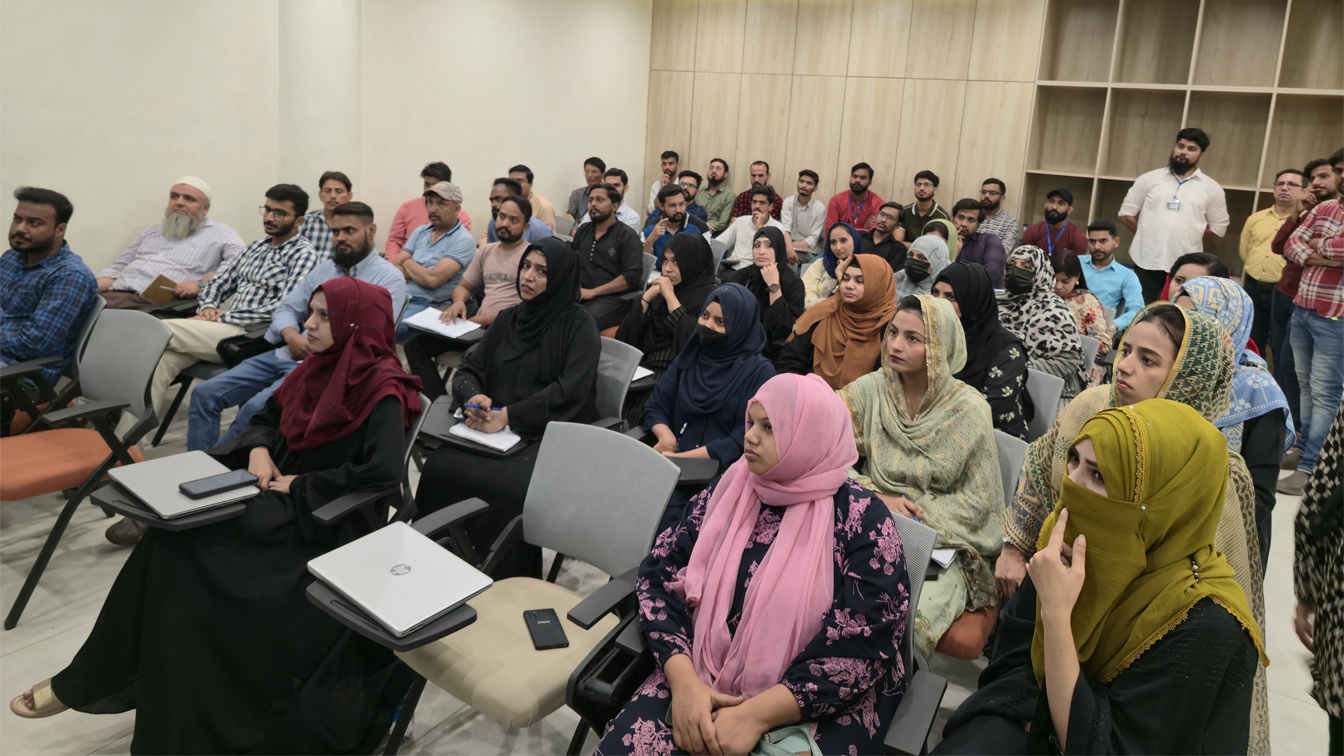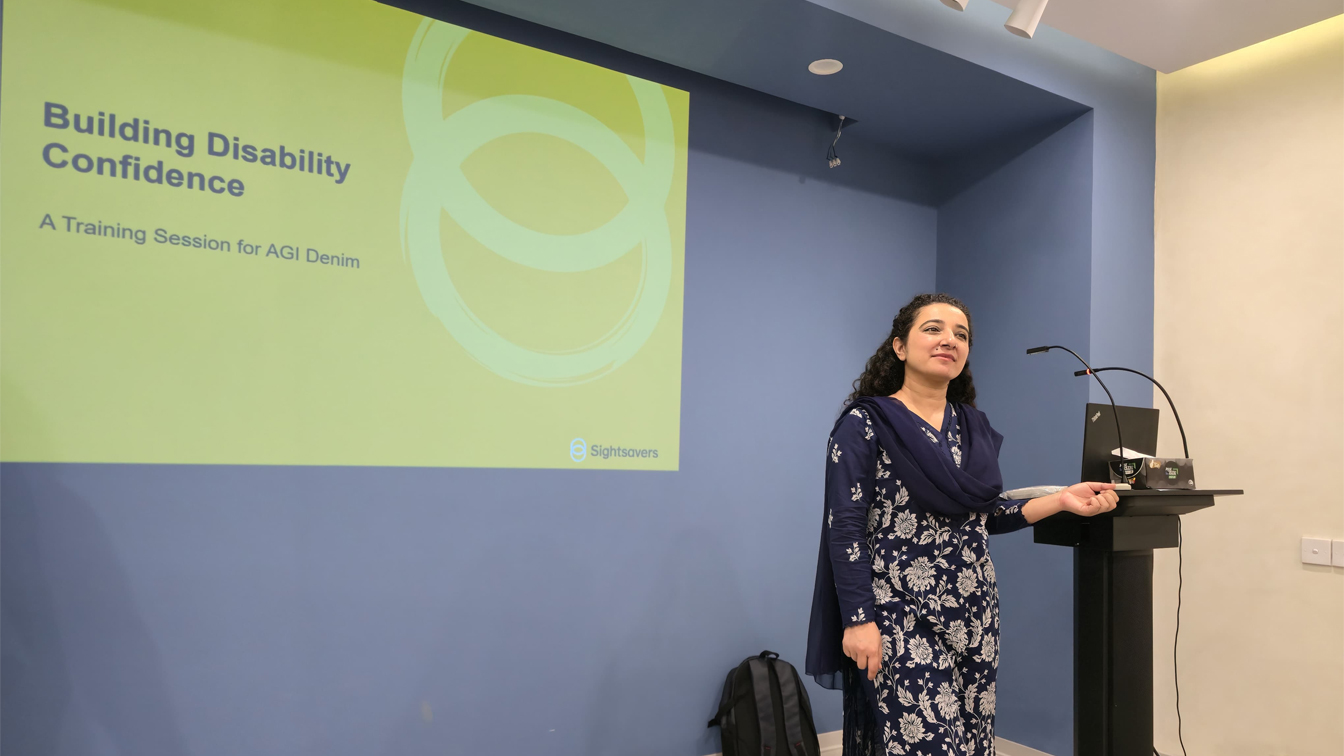As part of its commitment to promoting inclusive employment practices in Pakistan, the Pakistan Business and Disability Network (PBDN) In-House Disability Confidence Training at Akhter Textiles and AGI Denim in collaboration with Sightsavers for their HOD, Line Managers and Staff on 10th and 17th July, to build their capacity for disability inclusion. The session aimed at enhancing participants’ understanding of disability inclusion and equipping them with practical tools to foster an inclusive workplace culture. Over 50 participants, including line managers, department heads, and HR representatives, attended the full-day interactive workshop.
The key training objectives were
- To introduce the concept of disability inclusion in the workplace.
- To strengthen participants’ understanding of disability rights, models, and terminology.
- To address unconscious bias and promote disability confidence among management.
- To identify workplace barriers and actionable steps for promoting inclusion
The session began by grounding participants in the global and national realities of disability. According to the World Health Organization (WHO), an estimated 16–18% of the global population lives with some form of disability—making persons with disabilities one of the largest minority groups in the world. At the national level, data from the Pakistan Bureau of Statistics (PBS) suggests that approximately 14% of the Pakistani population lives with a disability. These figures underscore the critical need for inclusive and accessible environments, especially in the workplace. Participants were encouraged to view disability not as a limitation within the individual, but as a call for collective responsibility to eliminate environmental, attitudinal, and systemic barriers. The session emphasized that true inclusion requires proactive efforts to ensure that persons with disabilities can participate fully, equally, and with dignity across all aspects of life, including employment.
Models of Disability
During the session, participants were introduced to four key models of disability that shape societal attitudes and workplace practices
- Medical Model: Views disability as a problem or defect within the individual that needs to be fixed or cured through medical intervention.
- Charity Model: Frames persons with disabilities as dependent and in need of sympathy or charity, rather than empowerment or rights.
- Social Model: Identifies barriers in the environment and society, not the individual as the real disabling factors, emphasizing the need to remove these obstacles.
- Rights-Based Model: Recognizes disability as a natural part of human diversity and a human rights issue, advocating for equal treatment, dignity, and inclusion.
The Rights-Based Model was emphasized as the foundation for disability inclusion, encouraging employers to create enabling environments where persons with disabilities can thrive as equal and valued members of the workforce.
Appropriate Language & Terminology
A dedicated session was conducted on the importance of using respectful and inclusive language when referring to persons with disabilities. Participants were guided through common terms to use and avoid, emphasizing people-first language; such as “persons with disabilities” instead of derogatory terms like “handicapped,” or “special needs.” The session also introduced appropriate alternatives for other descriptors, such as “person without a disability” instead of “able-bodied” or “normal,” and “wheelchair user” instead of “confined to a wheelchair.” The training aimed to shift perceptions and encourage a vocabulary rooted in dignity, equality, and respect, supporting a more inclusive workplace culture.

Interactive Activities & Group Discussions
An engaging quiz to help participants differentiate between the concepts of inclusion, integration, segregation, and exclusion was also staged. Through this activity, participants realised that integration is a step towards inclusion, and true inclusion guarantees equitable participation for everyone. Participants also took part in a group discussion to identify workplace barriers faced by persons with disabilities. Key issues raised included lack of accessible infrastructure, inadequate transportation, absence of emergency evacuation protocols, and low societal awareness. The discussion also explored participants’ perceptions regarding the employability of persons with disabilities within their communities, prompting reflection on biases and the need for proactive inclusion strategies.
Legal Framework & Commitments
Participants were introduced to key national and international legal frameworks that support the rights and inclusion of persons with disabilities in Pakistan. Participants were also informed about the UN Convention on the Rights of Persons with Disabilities (UNCRPD) and Pakistan’s commitments under the Sustainable Development Goals (SDGs).The session emphasized the importance of understanding these laws for fostering workplace inclusion and compliance.
Group Activity – Action Planning for AGI Denim
Participants were divided into three groups and tasked with identifying practical steps AGI Denim could take to promote disability inclusion within their organization. The group setting encouraged collaboration, sharing of diverse ideas, and critical thinking around inclusive workplace practices.
Participants proposed a range of action points, including improving physical accessibility in the workplace, organizing regular sensitization and awareness sessions for staff, offering apprenticeship opportunities to persons with disabilities, and adopting inclusive recruitment and reasonable accommodation practices. These suggestions formed the basis for a collective action plan tailored to organizations operational context.
- The training fostered open dialogue, critical reflection, and active participation among leadership.
- Participants demonstrated a strong willingness to champion inclusion initiatives within their teams.
- Action points identified will be followed up in collaboration with PBDN to ensure sustainable implementation.
The Disability Confidence Trainings at Akhtar Textile and AGI Denim marked a significant step in building an inclusive workplace culture. By equipping its leadership with knowledge and practical strategies, these organizations are well-positioned to become a disability-confident employer and a role model within Pakistan’s textile sector. PBDN remains committed to supporting textile industry in advancing its inclusion journey.

